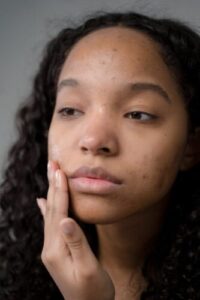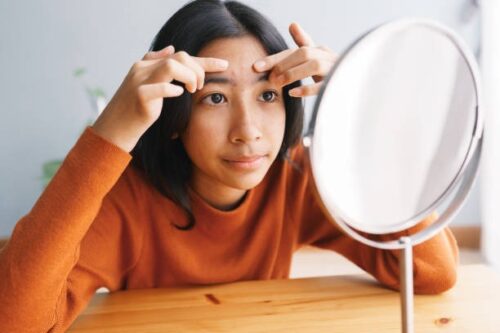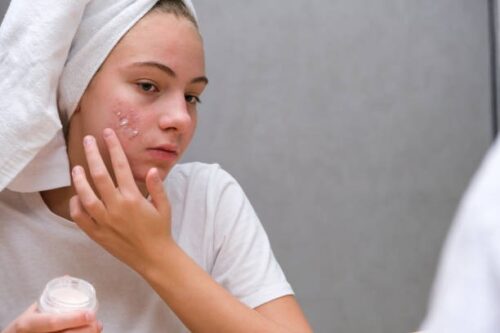Acne is a prevalent skin ailment impacting about 10% of the population. Although the condition may affect individuals at various ages, teens and young adults experience it most frequently. The signs and symptoms, which can be minor to severe, are a blockage of the hair follicles, which are tiny pores in the skin. Although most people will have significant acne in their teenagers and early years, the skin problem can also run in families and is linked to heredity.

Having acne may make daily life very difficult. It can impact every facet of people’s mental well-being, ranging from sadness and social disengagement to anxiety, stress, and low self-esteem. Additionally, if individuals have acne, they are aware that stress exacerbates the condition. It follows that many of them may experience a sense of being stuck, particularly if they have acne that is difficult to treat.
Beyond just the skin, acne can also negatively affect a person’s social life, self-esteem, and mental health. We’ll look at the connections between acne and mental health and offer advice regarding how to end the cycle so that the skin and mind can be healthy.
The Mind-Skin Connection
Research indicates that acne, regardless of its nature or degree of severity, can lead to psychological and emotional distress in its sufferers. This may occasionally be a symptom of or lead to a mental health illness. The fact that there exists a close relationship between the skin and the psychological system won’t surprise anyone. Skin outbreaks are often accompanied by moments of elevated stress, typical health conditions, or burnout, which most people can relate to.
This connects one’s brain to the skin. Additionally, psychodermatology, often known as psychoneurocutaneous medicine, focuses on it. Specialists in skin and psychological wellness treat the mind-skin relationship. They frequently collaborate to address every presenting symptom in moderation in order to achieve the greatest outcomes.
The relationship between the mind and skin extends beyond acne. Any skin disease can impact mental health. As a matter of fact, individuals suffering from long-term skin disorders such as atopic dermatitis (eczema) and psoriasis may also experience severe psychological and social discomfort. With these, a lower quality of life may be a result.
Breakouts can significantly adversely impact one’s self-esteem and negatively affect interpersonal interactions, which might result in social isolation. According to the experts’ recommendations, doctors should think about referring patients to mental health services when it is suitable, particularly for those who have experienced severe depression, body dysmorphic disorder, anxiety, suicidal thoughts, or self-harm in the past or present.

Can Stress, Anxiety, And Depression Cause Acne?
While they may worsen acne, depression, stress, and other challenging health or life conditions do not directly cause acne. A patient may have psychological problems in addition to acne if you see that they are “picking,” which is frequently an indication of stress or OCD behaviors. Another indication, especially in people, is when they avert their eyes or droop their heads all the time. Lastly, when there is a significant difference between the amount of acne and the degree of bother it causes them. In the end, it can be concerning if the patient is severely impaired by a few imperfections, even though they are little.
The root cause of acne is clogged skin pores. The reason for this is unknown. However, skin in acne sufferers finds it difficult to shed dead skin cells, and the excess cells accumulate and obstruct skin pores. Acne sufferers also produce excessive amounts of oil. Oil and dead skin cells work together to plug pores in the skin and trap germs inside, which results in pimples.
For those with underlying acne, anxiety, depression, and stress can trigger breakouts of acne. Once more, scientists still don’t fully grasp all of the causes behind this phenomenon. However it is common that breakouts can significantly negatively influence one’s self-esteem and negatively affect interpersonal interactions, which might result in feelings of social exclusion.
Effects of Acne and Acne Scars on Mental Health
One’s life can be greatly miserable due to acne. Here are a few emotions and problems people experience when they get acne.
Low Self-Esteem
People with acne feel self-conscious about their appearance. They become less confident and avoid making eye contact with others. A lack of self-worth is a result of this skin problem, which is why most girls wear a lot of cosmetics to cover up their acne, but it sometimes makes it worse. Boys, on the other hand, cover up their acne by letting their hair grow long. Therefore, it makes sense that those who have the condition, even mild acne, would wish to conceal it in some way because they feel ashamed about it.
People with severe acne, such as acne vulgaris patients in particular, experience mental health problems that significantly impact their quality of life. An example would be psychological sequelae from the perceived skin disease, or suicidal ideation in severe cases. Unfortunately, this can be common for patients with acne, particularly those with acne scars.
Social Withdrawal
Those who have acne frequently endure negative feedback or hurtful comments from people around them, which undermines their self-esteem. They begin to shy away from social events because they do not want to interact with others. They start to hesitate to form new friendships and relationships because they think their physical characteristics make others dislike them.
Impact On School
Individuals with acne within the school-age group may not be overly excited to go to school, which can hinder their long-term academic achievement. Their psychological well-being eventually suffers as a result of the increased criticism they receive for their physical appearance and body image. They also remain alone and avoid extracurricular activities due to the psychological impact acne has. That explains why some individuals avoid athletics, all because they feel self-conscious about wearing sportswear and suffer body acne. This is one of the most prominent psychosocial effects of the condition.
Impact On Work
Adults’ ability to work is also impacted by acne. People who suffer from acne avoid interacting with coworkers and build up a lack of confidence in their abilities at work. Because many employment depend on one’s looks, acne might limit professional options. Those with acne may also experience depression as a result of the psychosocial impact of these disorders.

Here’s What The Evidence Says So Far
Stress, anxiety, and depression can increase oil production and possibly hormones that can worsen acne. People experiencing depression may be more likely to give up on their treatment plan, especially when there’s deep scarring involved as in the case of acne vulgaris, which worsens acne and creates physical damage that individuals may consider an imperfection.
J Paediatr Child Health publications show a significant association between body and facial acne and mental health. This is shown in the results of the Cardiff Acne Disability Index (Dermatology Life Quality Index) and other studies in J Paediatr Child Health and different publications such as the one involving New Zealand Secondary Students. Acne patients experience psychological distress from social anxiety and self-consciousness mainly stemming from their facial appearance.
Medication For Depression And Anxiety Can Also Cause Acne
Note that some medications used for depression and anxiety can cause skin problems and make them worse. If one is taking medication for depression or anxiety, they have to keep in mind that it might affect the healing and recovery process of their acne condition. If symptoms are severe, then seeking the help of a therapist or a counselor can be a significant part of treatment since psychological health gets involved.
How Can I Manage The Emotional Distress Created By Having Acne?
The most crucial thing is to have the right diagnosis before proceeding with the right treatment. When the skin condition is addressed, individuals with acne and emotional problems should expect improvements in these areas. In addition to medical care, some of the most basic forms of therapy that are recommended include breathing exercises and relaxation. These are especially beneficial for treating anxiety symptoms.
Emotional discomfort can also be managed with more structured psychological techniques based on cognitive behavioral therapy. People frequently get treatments with mood or anxiety-regulating drugs on an individual basis. Talk about your symptoms with your dermatologist or general practitioner to identify these problems early. Not all depressive symptoms require medication; talking therapy might be helpful as well. You can sometimes self-refer to these groups, but your medical professional is the best person to recommend them.
It is not advisable to postpone mental health assessments or treatment because they may aggravate or cause skin conditions in addition to having a detrimental impact on treatment results. Treating the skin and mental health together is the best course of action.
It’s Necessary To Make Certain Lifestyle Adjustments
Now that we know how acne impacts a person’s state of mind and feelings, we can also see hope for recovery. Moreover, treating acne is easier than a lot of individuals believe. If they adopt good skincare practices early on, they can prevent acne from getting worse.
Acne Can Be Managed With A Basic Skincare Regimen That Includes An Appropriate Cleanser, Lotion, Gentle Moisturizer, And Pimple Cream. Of Course, One Should Remember Not To Touch Their Pimples And Keep Their Skin Clean.
Keeping Hydrated And Consuming Much Water Might Also Aid In Skin Cleansing.
Get Enough Rest And Make An Effort To Manage Stress By Doing Some Yoga Or A Little Exercise.
To Protect Oneself From Harmful UV Radiation, It Is Essential To Wear Sunscreen At All Times. Maintain A Hydrated Complexion To Fortify The Skin Barrier.
A Medically Supervised Facial Can Successfully Treat Acne, Improve Healing, And Significantly Reduce The Chance Of Deep Into The Skin Pitted Scars.
Final Thoughts
Undoubtedly, acne has negative impacts on psychological wellness and has turned into a social stigma. Therefore, instead of criticizing individuals for having acne, we ought to support them and help them get rid of it. If they have this issue, we should reassure them that it is easily treatable and not to give up.
To permanently get rid of acne, it is vital to make an appointment and seek professional assistance if one finds it difficult to manage the condition independently.
Frequently Asked Questions (FAQs)
How acne can affect your mental health?
How do you deal with severe acne mentally?
What are the psychological reasons for pimples?
Can emotions affect acne?
Can emotional stress cause acne?
Does bad mental health affect the skin?
Does mental health affect the face?
Do negative thoughts cause acne?
How does anxiety affect acne?
How can I improve my self-esteem with acne?
Can stress acne be treated?
Do people care if you have acne?
Can anxiety and depression cause skin problems?
Is acne a disease or disorder?
Where do pimples appear when stressed?
Is acne physical or emotional?